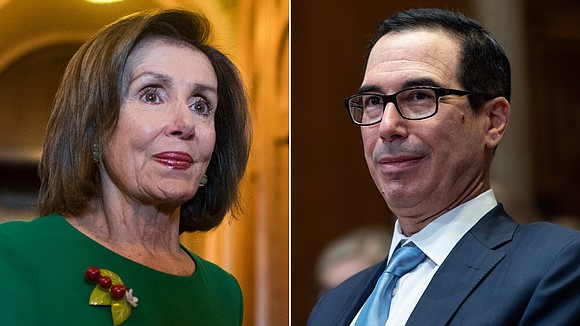Mnuchin and Pelosi no closer on stimulus even as they agree in principle to fund the government
CNN/Stylemagazine.com Newswire | 9/7/2020, 11:21 a.m.

By Kevin Liptak and Jessica Campisi, CNN
(CNN) -- The Trump administration and House Democrats have agreed in principle to fund the government past the end of the month -- but don't appear any closer to striking a deal on additional coronavirus stimulus.
Speaking Sunday, Treasury Secretary Steven Mnuchin said he and President Donald Trump continue to press for a narrower package than House Speaker Nancy Pelosi is demanding.
"Where we're really stuck is on certain policy issues but more importantly the topline," Mnuchin said on "Fox News Sunday," referencing the total sum of a stimulus bill.
"Let's do a more targeted bill now," he went on, saying Republicans planned to move on such a package later this week. "If we need to do more in 30 days we'll continue to do more. But let's not hold up the American workers and American businesses."
Mnuchin's comments come amid stalled stimulus talks between top congressional leaders and White House officials. Negotiations between Pelosi, Senate Minority Leader Chuck Schumer and top White House officials imploded nearly a month ago and have yet to make much progress since.
Democrats are pushing for a wide-ranging, multi-trillion dollar proposal with funding for schools, rental assistance, health providers and small businesses. Senate GOP leadership, meanwhile, has been working for weeks behind the scenes toward building internal consensus on a scaled-back, or "skinny" proposal that would include funds for education, small business, a scaled-back enhanced federal unemployment benefit and liability protections.
The continued arguing has led to an increasingly pessimistic view of whether another relief package on Capitol Hill -- following on the $2.2 trillion CARES Act passed in March -- is even possible.
Asked why Trump hasn't invited Pelosi and Schumer to the Oval Office for talks, Mnuchin demurred.
"The President constantly has not only his economic team in the Oval Office but now Mark Meadows and I have been on the phone with Mitch McConnell and the Senate Republicans every single day," he said. "Any legislation requires bipartisan support."
Mnuchin and Meadows, the White House chief of staff, have rejected the Democratic topline repeatedly and pressed to move a smaller scale package consisting primarily of areas where at least topline bipartisan agreement exists. Pelosi and Schumer have refused, castigating Republicans for underestimating the scale of the need created by the worst pandemic in a century.
During an interview Sunday on MSNBC's "AM Joy," Pelosi blamed the Republicans and the Trump administration for the lack of action on a stimulus bill. "We're not doing anything. Now, could we have saved all of those people? Not all, but many. The number of people who have been infected has grown by the millions," Pelosi said, adding that a House Committee will take action this week on a bill and then take a vote.
"We have to make sure the public knows how we can solve this, and why the administration is standing in the way of crushing the virus," she said.
The stalled negotiations do not appear to extend to government funding, which expires at the end of September. Mnuchin said he and Pelosi have agreed to move a clean, continuing resolution this week that would fund the government, though specific details have yet to be sorted.
"We haven't agreed on the specific details but my expectation is it would be through the beginning of December," he said. "We both don't want to see a government shutdown."
What is contained in the stop-gap government funding measure, known as a continuing resolution, and its length remain the topic of discussion between the Trump administration and Democrats.
Mnuchin predicted the unemployment rate would be at pre-pandemic levels by the start of 2021 -- if the President wins a second term.
"The President's going to get it back down to 3% or 4% where it was before all of this in the beginning of next year when he's reelection," he said.
But the US job market remains in a deep hole during the ongoing pandemic, and the recovery is losing some of its momentum.
US employers added 1.4 million jobs in August -- a slowdown in job growth from earlier this summer: Employers added a revised 1.7 million jobs in July and 4.8 million jobs in June. The unemployment rate fell to 8.4% from 10.2% in July, marking the first time the jobless rate has fallen below 10% since March.
America is still down 11.5 million jobs from February, and millions of families need benefits to make ends meet as Congress continues arguing about the next stimulus bill.
Mnuchin vowed the President would take steps to address the ballooning national debt if victorious in November.
"I think the former vice president if he were elected would have socialist economic policies that would take the debt out of control," he said of Democratic nominee Joe Biden. The debt, though, has continued to expand under Trump, including after his 2017 tax cut that added about $1.5 trillion to the debt.
The US debt is projected to exceed the size of the entire country's economy next year -- the first time the federal debt could be bigger than the US gross domestic product since 1946, the Congressional Budget Office said.
"There's no question in a second term, once the economy is back, we will focus on this issue," Mnuchin said.
This story has been updated with comments from Democratic House Speaker Nancy Pelosi.



